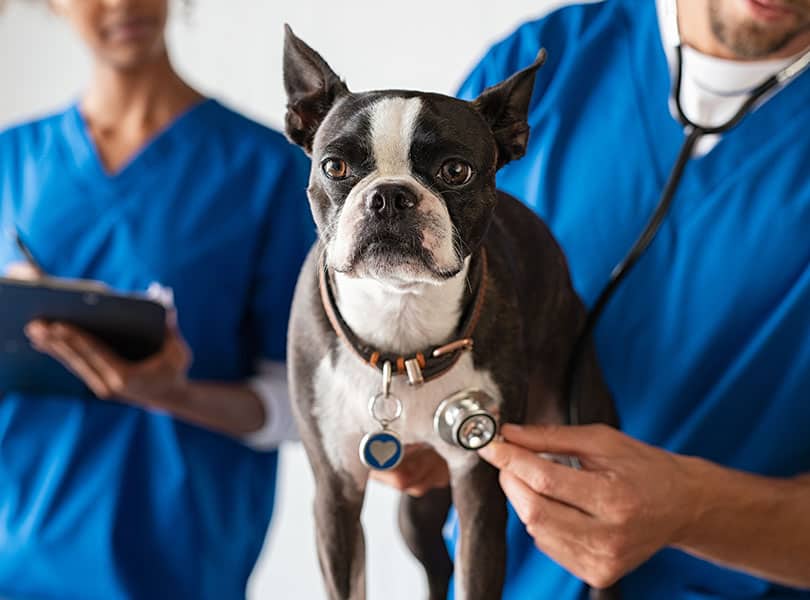Exploring the Necessary Services Provided by a Veterinary Cardiologist: Comprehending Ultrasound and CT Check Strategies
Veterinary cardiologists play an essential role in the health of animals by diagnosing and treating various heart disease. They make use of innovative imaging strategies, such as heart ultrasound and CT scans, to provide exact evaluations. Each technique has its unique benefits and applications. Recognizing these strategies is crucial for animal proprietors looking for the very best care for their buddies. What factors should animal owners take into consideration when picking between these analysis tools?

The Duty of Vet Cardiologists in Pet Dog Health Care
Vet cardiologists play a crucial role in the medical care of pet dogs, concentrating particularly on detecting and dealing with heart-related problems. They possess specialized training that enables them to translate complex analysis examinations and recognize various cardiovascular issues. These specialists make use of sophisticated techniques, such as echocardiography and electrocardiography, to assess heart function and framework accurately.Veterinary cardiologists likewise develop tailored therapy strategies that may include drugs, way of living alterations, and, in many cases, medical interventions. Their expertise encompasses informing family pet proprietors about heart wellness, highlighting the relevance of regular exams and very early detection of potential troubles. Cooperation with basic veterinarians is essential, as it assures detailed look after family pets with presumed heart problems. By providing specialized services, veterinary cardiologists greatly boost the quality of life for pet dogs and supply comfort for their owners, enhancing the significance of heart health and wellness in general pet dog health.
Usual Heart Issues in Family Pets
Typical heart concerns in family pets can significantly influence their wellness and lifestyle. Heart whisperings, various types of cardiomyopathy, and congenital heart problems are among the most widespread problems that vets experience. Cancer Veterinary Near Me. Understanding these issues is crucial for animal owners to guarantee prompt diagnosis and suitable treatment
Heart Murmurs in Pets
Although heart murmurs can be a resource of issue for pet dog proprietors, they are not constantly a measure of major health problems. A heart whispering is an unusual audio created by unstable blood flow within the heart. In pets, these murmurs can be brought on by numerous elements, including hereditary heart issues, shutoff concerns, or perhaps tension throughout examinations. Several pets with heart whisperings lead regular lives without significant health and wellness impacts. To determine the underlying reason, vet cardiologists usually utilize diagnostic strategies such as echocardiograms and Doppler ultrasounds. Early detection and evaluation are crucial, as they might help manage any type of possible cardiac issues efficiently. Animal owners are encouraged to consult their vet for an extensive evaluation if a heart murmur is discovered.
Cardiomyopathy Types Explained
Cardiomyopathy includes a group of diseases affecting the heart muscle, bring about jeopardized cardiac feature in pet dogs. One of the most usual types include expanded cardiomyopathy (DCM), hypertrophic cardiomyopathy (HCM), and restrictive cardiomyopathy (RCM) DCM mainly affects dogs, creating the heart to increase the size of and weaken, which reduces its ability to pump blood successfully. On the other hand, HCM is a lot more common in cats, characterized by the thickening of the heart walls, commonly leading to obstructed blood flow. RCM, though much less typical, occurs when the heart muscular tissue becomes stiff, limiting its capability to loaded with blood. Each kind offers one-of-a-kind challenges in medical diagnosis and therapy, necessitating specialized vet cardiological examination to ensure peak administration and look after influenced pet dogs.
Genetic Heart Defects
Congenital heart defects represent a considerable classification of heart concerns in pets, distinctive from obtained problems such as cardiomyopathy - Cancer Veterinary Near Me. These problems are structural problems existing at birth, affecting the heart's normal feature. Common types include license ductus arteriosus, ventricular septal flaws, and pulmonic stenosis. Signs may vary extensively, varying from mild to extreme, and can consist of workout intolerance, coughing, and difficulty breathing. Early medical diagnosis with innovative imaging strategies like ultrasound is vital for effective management. Vet cardiologists play a crucial role in recognizing these problems and advising proper treatment choices, which may include clinical monitoring or medical intervention. Identifying genetic heart flaws enables for far better end results and enhanced quality of life for affected pets
Recognizing Cardiac Ultrasound: Just How It Works
A substantial number of veterinary practices now utilize cardiac ultrasound as a crucial analysis tool for assessing heart health in animals. This non-invasive technique utilizes high-frequency audio waves to develop photos of the heart's structure and function. Throughout the treatment, a veterinary service technician applies a gel to the animal's breast and utilizes a transducer to discharge ultrasound waves. These waves bounce off the heart and surrounding structures, generating real-time pictures on a monitor.Veterinarians can examine various facets of cardiac health, including chamber dimension, wall movement, and valve function. In addition, heart ultrasound enables the discovery of problems such as liquid buildup and genetic heart issues. This method is crucial for detecting problems that may not be noticeable with basic radiographs. By providing detailed information about the heart's makeup and performance, cardiac ultrasound aids in formulating efficient therapy plans for animals struggling with cardiovascular disease.
The Relevance of CT Checks in Identifying Heart Conditions
Exactly how do CT scans improve the diagnosis of heart problems in vet medicine? CT scans provide in-depth cross-sectional images of the heart and bordering structures, permitting veterinarians to picture complex anatomical relationships. This imaging technique is particularly advantageous in determining congenital heart issues, cardiac tumors, and irregularities in blood vessels. By visit this page utilizing advanced imaging formulas, CT scans can evaluate heart chamber sizes and function, offering a thorough sight that may be hard to achieve with traditional methods.Additionally, CT angiography can imagine blood circulation and identify locations of stenosis or blockage, which is crucial for planning prospective treatments. The rate and accuracy of CT scans additionally assist in quick diagnoses, vital in emergency situations. Eventually, the unification of CT scans right into veterinary cardiology considerably improves the accuracy of diagnoses, making it possible for targeted therapy plans and boosting client outcomes for animals struggling with heart conditions.
Contrasting Ultrasound and CT Scan Methods
While both ultrasound and CT scans are important tools in veterinary cardiology, they supply distinct benefits and constraints that influence their usage in detecting heart conditions. Ultrasound, or echocardiography, supplies real-time imaging of the heart's framework and function, permitting veterinarians to assess heart chambers, valves, and blood circulation. It is specifically reliable for assessing conditions like congestive heart failure and cardiomyopathy. However, ultrasound may be restricted in visualizing specific physiological frameworks because of individual dimension or obesity.In contrast, CT scans deal comprehensive cross-sectional photos of the heart and surrounding tissues, making them ideal for determining architectural problems, lumps, or vascular problems. Although CT scans offer complete insights, they call for sedation this website and may include radiation direct exposure. Inevitably, the selection between ultrasound and CT scans depends on the details scientific circumstance, the patient's problem, and the info needed for an exact medical diagnosis.
Therapy Choices Available With Veterinary Cardiology
Veterinary cardiology provides a variety of treatment options tailored to attend to various heart disease in animals. Therapy strategies commonly begin with way of living adjustments, including diet plan changes and exercise adjustments, targeted at enhancing general heart wellness. Medicines play an important function, with cardiologists prescribing drugs such as diuretics, beta-blockers, and ACE inhibitors to manage signs and symptoms and enhance heart function.In more severe cases, interventional treatments, such as balloon valvuloplasty or stent positioning, may be essential to minimize obstructions or enhance blood circulation. For sure genetic heart problems, medical alternatives might be discovered to fix architectural concerns. Additionally, continuous tracking and follow-up treatment are necessary elements of a detailed therapy strategy, enabling prompt adjustments based upon the animal's action to therapy. In web general, vet cardiology concentrates on providing efficient, individualized like enhance the health and wellness of pet patients with heart conditions.
Just how to Prepare Your Family Pet for a Cardiac Examination
Preparing a family pet for a cardiac examination is important to ensure precise results and a smooth procedure. Owners need to first arrange the consultation with the veterinary cardiologist and discuss any kind of certain requirements or problems. It is recommended to withhold food for at the very least 12 hours prior to the assessment, as this assists improve imaging quality during procedures like ultrasound or CT scans.Additionally, preserving a tranquil setting on the day of the consultation can help in reducing the family pet's anxiousness. It is advantageous to bring along any relevant medical records, including previous tests and medicines (Cancer Veterinary Near Me). Owners need to likewise make particular that their family pet fits and leashed throughout transport to the clinic. Lastly, acquainting themselves with the analysis procedure can assist and minimize worries in asking notified questions throughout the consultation. By adhering to these actions, owners can contribute substantially to the efficiency of the cardiac assessment
Frequently Asked Inquiries
How much time Does a Heart Ultrasound or CT Scan Take?
The duration of a cardiac ultrasound generally ranges from 30 to 60 mins, while a CT scan might take about 15 to thirty minutes. Factors such as the patient's condition can affect these time estimates.

Exist Any Type Of Risks Related To These Diagnostic Treatments?

Can I Keep With My Family Pet Throughout the Treatment?
The vet center's policy usually determines whether pet dog owners can remain during procedures. While some facilities urge proprietor existence for convenience, others might call for separation to guarantee safety and security and ideal problems for analysis imaging.
Exactly how Much Do These Diagnostic Examinations Normally Price?
The prices of diagnostic examinations, such as ultrasound and CT scans, typically differ based on location and facility. Generally, costs range from a few hundred to over a thousand dollars, reflecting the complexity and technology involved.
What Is the Recovery Process After a Heart Analysis?
The recuperation process after a heart analysis involves monitoring the family pet for any instant reactions, making certain convenience, and restricting exercise. Vets usually supply post-evaluation directions to guide pet proprietors throughout this vital healing period. Heart whisperings, different types of cardiomyopathy, and congenital heart problems are amongst the most widespread conditions that veterinarians encounter. A heart whispering is an irregular sound produced by turbulent blood circulation within the heart. Cardiomyopathy includes a group of diseases influencing the heart muscle mass, leading to endangered cardiac feature in pets. Hereditary heart issues represent a substantial category of heart issues in animals, distinctive from acquired conditions such as cardiomyopathy. Ultrasound, or echocardiography, gives real-time imaging of the heart's structure and function, permitting veterinarians to analyze heart chambers, shutoffs, and blood flow.